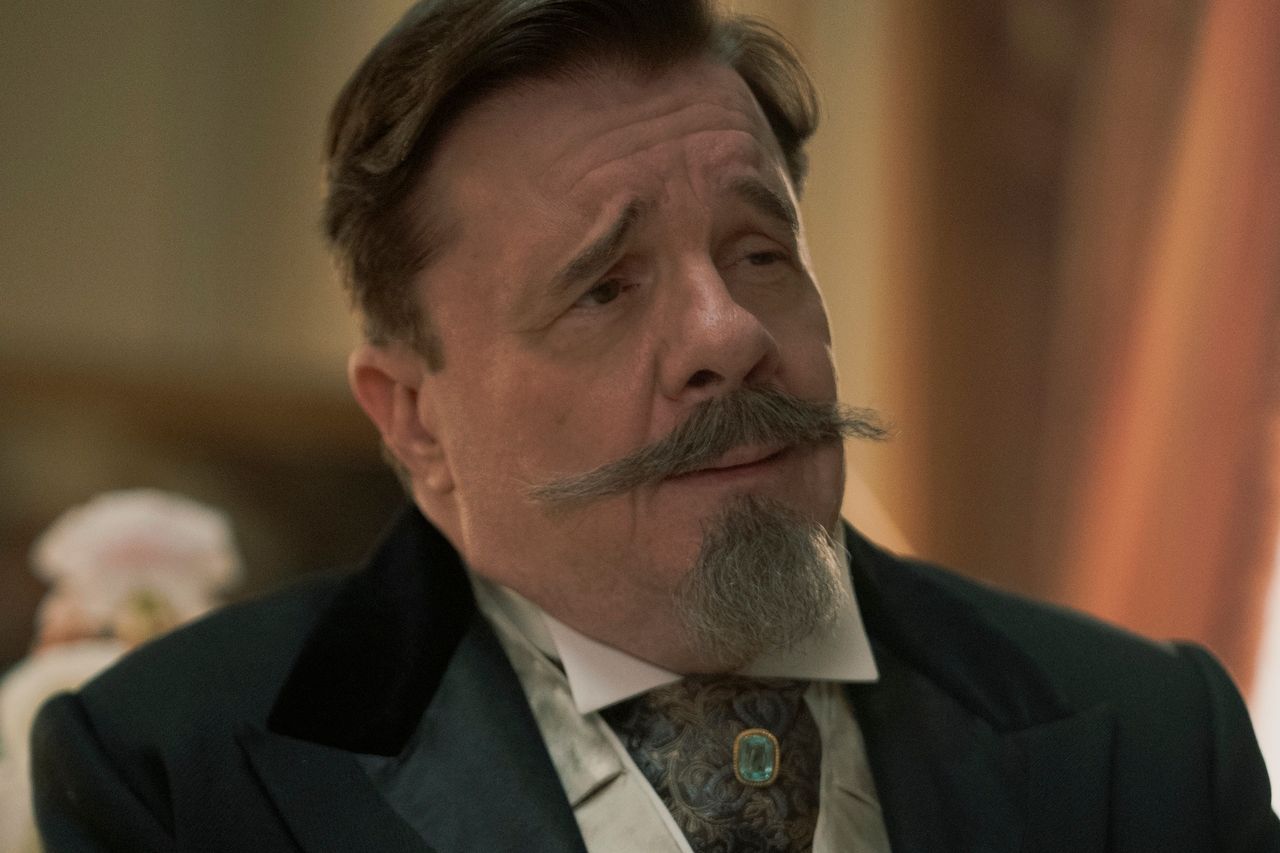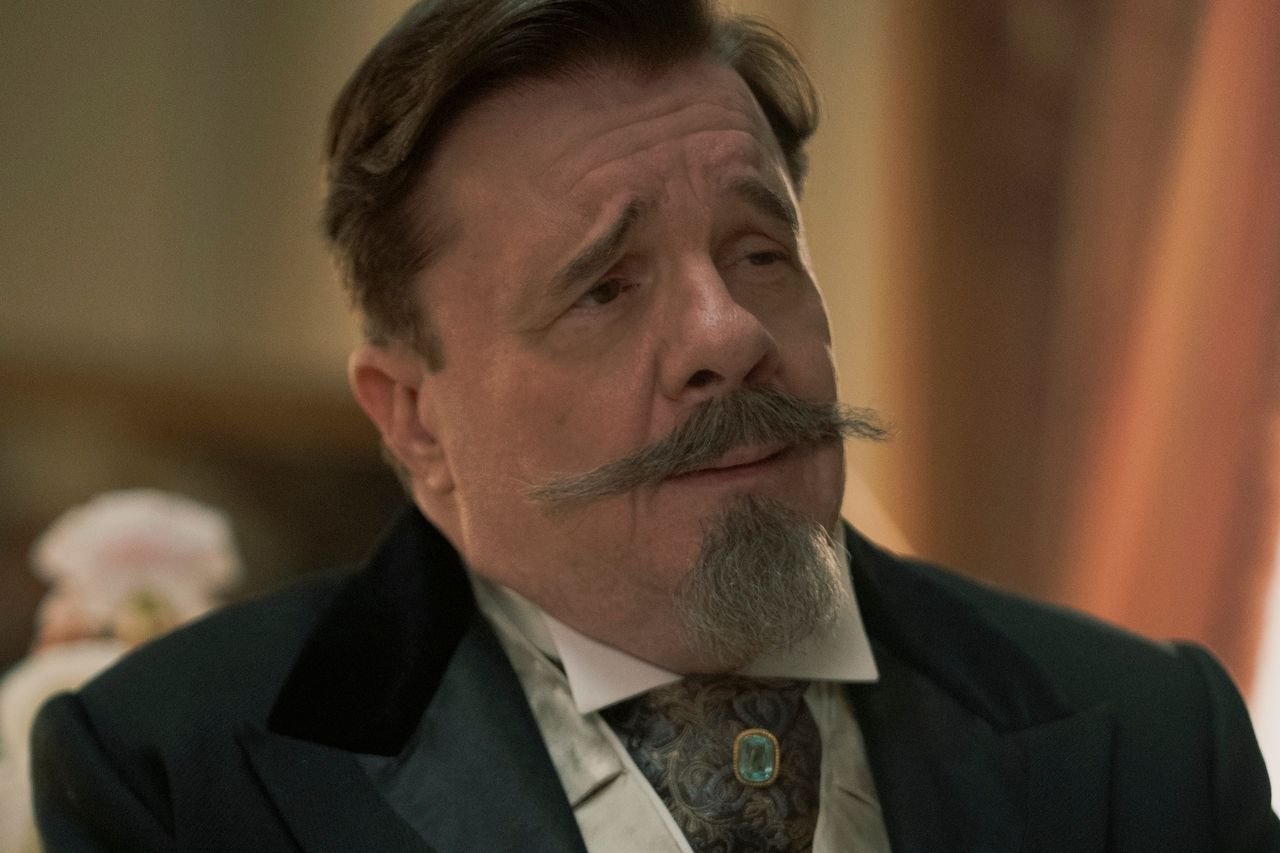
There’s nothing more dangerous than overestimating your importance in polite society, even if you think you’re the king of all your fabulous lady friends. That’s a lesson Ward McAllister learned the hard way, about a century before Truman Capote made the same mistake. On Sunday night’s episode of The Gilded Age, titled “Ex-Communicated,” the burn book that made McAllister infamous rocks New York society.
The real McAllister, played on television by the great raconteur Nathan Lane, was, as Lane puts it, a “peculiar little man,” who had a significant hand in shaping post–Civil War American high society. Born in Georgia, McAllister was a lawyer who married a minor heiress, toured Europe, then wormed his way into the upper echelons of New York’s elite, advising them on how to emulate the Old World’s aristocracy and becoming a special friend of Mrs. Astor. He made Newport, Rhode Island, popular as a playground for the ultrarich, came up with the notion of “the 400” — a way of delineating the “in” crowd by limiting it to the number of people who could comfortably fit inside Mrs. Astor’s ballroom — and was an infamous wine snob. Then, as fictionalized in The Gilded Age, McAllister published Society As I Have Found It, an 1890 memoir–slash–tell-all about his rich friends that didn’t directly name names but gave away enough details to make the women he’d counted as friends turn against him.
On The Gilded Age, we see the publication of that scandalous memoir, which everyone reads and then pretends they haven’t, as well as McAllister’s attempts to win back his old friend Mrs. Astor (played by Donna Murphy) and his newer friend Bertha Russell (an analog for Alva Vanderbilt played by Carrie Coon). Neither attempt succeeds, and it looks as if Ward may be exiled for good. “Just my luck,” Lane deadpanned over Zoom, “right when the show’s a hit.” But Lane, who’s been a delightful, very moustache-forward southern presence on the HBO series, thinks McAllister would’ve been pleased with his depiction on the show. “Look,” Lane added, “he’d just be thrilled that we are talking about him.”
How does it feel to have so many great leading ladies of the American theater mad at you all at once?
Oh, that’s par for the course.
What do you think motivated Ward to publish the book in the first place? Was it just hubris?
When I first started researching this gentleman, I thought, Well, that’s the perfect exit. Everyone has compared it to Truman Capote. It’s very similar. His ego got the better of him, though he certainly didn’t reach the heights of Truman Capote. When I first read it, I thought, Wow, he’s a terrible writer. It’s really boring, and it’s mostly just about himself. I think he wanted to rub his expertise in their faces a bit. When you read it by today’s standards, you think, This is pretty tame stuff. But he was breaking the code of silence. He refers to Mrs. Astor as the queen of society and says how quickly she can dismiss you from the realm. He also went after Mrs. Fish a bit. I don’t think it was for the money. I don’t think it was revenge so much. I think it was overestimating his power in the world.
Maybe he bought into his own mythology, as Mrs. Astor tells him on the show. He thought he was the king of society, but they had the power.
I think so. He was distantly related by marriage to Mrs. Astor, which is how he finagled his way into her orbit. It’s very telling that when he first went to New York, he received an inheritance of a thousand dollars, and he spent it all on evening clothes so he could go to parties and meet people. There’s a whole side of his life they don’t really get into much on the television show.
His wife, for instance, didn’t seem to participate in all his social escapades.
And then she was an invalid. He’s a fascinating character. He had a daughter and two sons, and his daughter co-hosted the parties, especially in Newport. There he would give these elaborate barbecues. He’s included in The Age of Innocence, where he’s called “Sillerton Jackson.” He was also a lawyer! He wouldn’t have been a good lawyer, but he would have been great at picking the restaurant you went to at lunchtime. He decided to put all his energies into creating an American aristocracy. He could be really petty and annoying, and I’ve read people talking about what a charmer he was. What’s weird is that he was exactly the kind of person he would have tried to exclude from his so-called 400.
What’s it like to don that gigantic moustache when you’re playing him?
When we tried to do what he actually looked like, it seemed like a caricature. That was too big. It’s very itchy, but the only real trouble was during COVID, when we were having to put the masks on. We constantly had to fluff up the moustache and goatee and get it camera-ready. It was always a relief to get to the end of it and take it off.
Mrs. Astor brutally cuts Ward out after he publishes the book, even as he’s begging for her forgiveness. What was it like to film that scene with Donna Murphy?
I’ve known Donna a long time and she’s fantastic, and because it’s such a complicated relationship it was really interesting to play. She doesn’t want to give him an explanation, which he’s sort of demanding, but the bottom line is that he was probably her closest friend, even more than her children. She spent a lot of time with him, and they had similar interests, which were basically creating this society together. At one point, he says, “You can’t do this to me. I am society.” I was playing that not so much with arrogance but as something emotional. He really has devoted his life to creating this with her. Maybe the relationship could have been repaired but then he goes one step further because he gets angry at her for being condescending and brings up her husband. You don’t talk about him on the yacht with the showgirls. But he went there, and that was the nail.
On the other hand, Bertha Russell is a little more sympathetic to Ward, but even she insists that she can’t cross the line and bring him back into society.
Yeah, I don’t buy that. She says she couldn’t help him out of that situation because she doesn’t have the power. Well, she actually does now, and he’s the guy who gave it to her! He guided her into that world. She cozied up to him and won his favor, and he really helped her out. The real Ward saw that you couldn’t have society with just the old families anymore: You needed the nouveau riche.
In some ways, that’s even more ruthless than Mrs. Astor, but maybe that’s in character for Bertha.
But he’s also sort of philosophical in that scene when he says it’s her turn, so enjoy it. That’s one of the things I always thought from the beginning reading these scripts. Ward’s the only one who’s actually enjoying this! Everyone’s so fucking repressed with all these secrets. He’s here going, “We’re going to have fine wine and great food, and we’re going to parties and balls.” He does really enjoy that life. Maybe because he was an outsider. He singlehandedly made Newport the place to go for the very wealthy. Before that, it was a place where Southerners would go to escape the heat. I think he did enjoy rubbing his southernness in their faces a bit.
And you have that very strong southern accent on the show, which does stand out.
From what I’ve read, there’s a notion from people watching that I just made the accent up and decided to wear a lot of facial hair. But that’s very much him. They used to ridicule Ward’s accent behind his back! And they ridiculed it after the book came out even more. In his writing, he kept using all these very southern phrases at the end of all these sentences. The sentence seems to be over, and there’s a comma and then he always goes, “Don’t you understand?” or “Don’t you see?” I told the director, Michael Engler, it would be fun to put some of that in and then in a fight have someone go, “I do see, but I don’t understand!”
Do you think this is the last we’ll see of Ward McAllister?
They get picked up for a fourth season, and I’m leaving the building! I mean, it is a sort of farewell, but you could bring him back. It might be an interesting story line to see his funeral. Their relationship was so important to Mrs. Astor, but she didn’t go. She said she had a previous engagement. Mrs. Fish did not show up. She really disliked him. But there were some famous people at his funeral. A Vanderbilt was there.
He died eating alone at the Union Club, which is a sad though kind of poetic end.
You could do a whole thing about the day he died, why he was eating alone. He did have a whole life after the book debacle. He didn’t give up. He wrote a gossip column called “Ward McAllister’s Letters.” He published a list of who would be in the 400 in the Times. He put everyone’s names in it, too, and they were pissed if they were in it and pissed if they were left out. That was the final shot across the bow, actually naming names. Someone was quoted at his funeral as saying, “Poor Mr. McAllister, if only he hadn’t written a book.” Imagine if it starts selling now because it was on a hit HBO series.
Watching the episode where Gladys gets married, it was fun to see you among all these theater people in the crowd scenes. What’s it like between takes on set?
It’s not unlike The Gilded Age. A lot of gossiping. We sit around and catch up with each other’s lives. In those scenes, we’re like glorified extras. We’re just sitting there watching poor Taissa sobbing down the aisle. It’s funny, we don’t have a National Theatre, but this is the closest we’ve come to a repertory company. It’s some of the best actors working together, and they’re all such pros. And then there’s great young people like Ben Ahlers. Clock Twink — that’s what people call him. That kills me.
I’ve discovered he’s actually tall in person, which maybe messes with the twink of it all.
He’s a little butch for a twink, but he’s adorable. He’s the sweetest guy, and I’m happy to see him having a moment.
